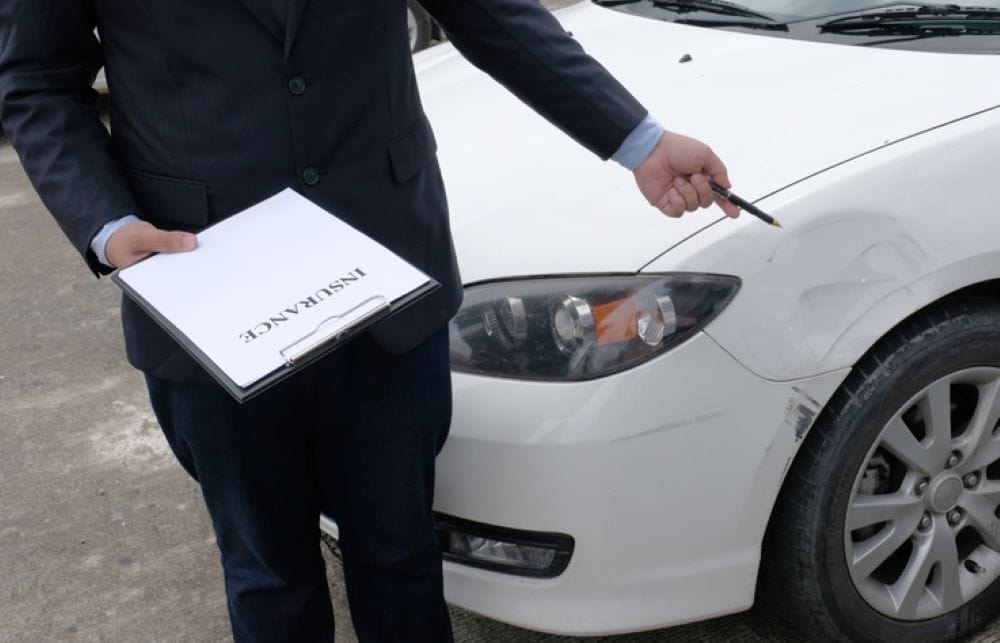
When faced with the question of “what to do if someone falsely claims you hit their car,” it’s a stressful ordeal that requires immediate and careful response. In this article, you’ll learn the critical steps to take to protect yourself from false accusations from the importance of collecting evidence, to reporting the incident correctly, and the nuances of dealing with your insurance provider. We’ll equip you with practical advice to handle this challenging situation with confidence, without disclosing your rights or impacting your insurance rates adversely.
Stay Calm and Assess the Situation
The first instinct when faced with a false claim might be to panic or lash out in anger. But, let’s take a pause here. It’s crucial to remain calm in such challenging situations. A composed demeanor allows you to maintain clear thinking and prevent unnecessary escalation during confrontations. Being calm is not just about controlling your emotions; it’s the key that unlocks your understanding of legal rights and responsibilities, protecting you from potential insurance fraud.
Having a clear understanding of state laws is a crucial step that aids in staying calm when dealing with false claims. So, how do you manage your emotions and assess the situation effectively? Let’s explore further.
Evaluate the Scene
Once you’ve managed to keep your emotions in check, the next step is to evaluate the scene. If you’re on-site when the accusation is made, documenting the scene is essential. This includes:
Taking photos or videos with a smartphone
Capturing the vehicles involved
Capturing their positions
Documenting any visible injuries
Noting skid marks, traffic signs, and road conditions
This evidence is critical in proving liability and damages, or in this case, the absence thereof, in a wrongful death claim.
Gather Crucial Evidence
Gather evidence is a critical step in the process of dealing with a false car accident claim. It’s like piecing together a jigsaw puzzle, where each piece of evidence helps to create a clear picture of the incident. This evidence, which can include:
photos
videos
receipts
witness statements
plays a crucial role in disproving the false accusations.
Obtain Witness Contact Information
Witnesses are the unbiased eyes and ears at the scene of the incident. Their statements can affirm your version of events and play a significant role in disproving the false claim. Therefore, it’s necessary to approach witnesses at the scene immediately to request their contact information and take notes of their observations.
Look for Surveillance Footage
In an era of ubiquitous cameras, surveillance footage can often provide definitive evidence of the incident. Many businesses and public spaces have surveillance systems that may have captured the incident. Therefore, it’s essential to identify potential cameras in the vicinity promptly and contact the relevant proprietors or authorities to secure the footage.
Exchange Information and Report the Incident
While it may seem counterintuitive to share your contact and insurance details when facing a false claim, it’s crucial to adhere to standard procedures. This exchange of information not only helps maintain transparency but also prevents further complications and legal consequences. Moreover, involving the police ensures the creation of an official record of the incident, irrespective of any pressure to settle privately.
Share Contact and Insurance Details
Exchanging information after a car accident is a crucial step in resolving insurance claims and addressing potential legal matters. This involves collecting the following information from the other party involved in the incident:
Names
Contact numbers
Insurance details
License plate numbers
Even if the other party refuses to share their information, you must gather as much information as possible and seek legal guidance if necessary.
Remember, many states require drivers to share their information after car accidents, and failing to do so can have legal consequences.
Notify Law Enforcement
The involvement of law enforcement is not only crucial for creating an official record but also provides a neutral perspective of the accident. Specific legal criteria, such as injuries or a minimum amount of property damage, necessitate notifying the police of a car accident. If the police do not respond to the scene of a minor accident, it is the driver’s responsibility to report it to the local police within a specified timeframe. Failure to report an accident can have serious legal consequences, including the possibility of a suspended driver’s license or charges of a hit-and-run felony.
If a false claim is tied to criminal activity, it is important to file a police report for further investigation and potential criminal charges.
Communicate with Your Insurance Company
Upon receiving a notice of a false claim, your first call should be to your insurance company promptly. Your insurance company is obligated to defend you against false claims and can offer guidance throughout the resolution process. This communication involves providing them with all collected evidence, such as witness statements, immediately after reporting the false claim.
Provide Collected Evidence
Providing your insurance company with all the evidence you’ve collected is another crucial step in dealing with a false car accident claim. These could include photos of the accident scene, witness statements, and any communications with the accuser or their insurance company. Keeping comprehensive records of all communications, including emails, letters, and call summaries, is important to ensure a smooth investigation process.
Sharing all this information with an attorney can help effectively dispute any lies reported to a law enforcement officer or the insurance company.
Cooperate with Investigations
Cooperating with the police and your insurance company is crucial to ensure that the facts of the accident are properly documented. Cooperation involves providing them with any additional information they may require to investigate the claim. If there’s a case of mistaken identity by the insurance company attributing a claim to the wrong policyholder, it’s important to rectify this as part of the investigation process.
So, how do you provide additional information and encourage witness cooperation during the investigation process? Let’s explore further.
Encourage Witness Cooperation
Witnesses play a crucial role in providing unbiased accounts of the incident. It’s important to encourage them to provide testimony by clarifying the purpose of the investigation as a means to uncover the truth, not to assign blame. Reinforcing the investigation’s aim for preventing future incidents can further encourage detailed witness cooperation.
Ensure that witness statements are accurate by confirming details with the witnesses, fortifying the reliability of their accounts. And remember, maintaining a neutral tone and avoiding intimidation can make witnesses feel comfortable during interviews, thereby promoting their willingness to cooperate.
Protect Your Future Insurance Rates
False claims can raise insurance rates if they are not properly disputed and resolved. A false insurance claim, as an example of fraudulent insurance claims, leads insurers to raise premiums to offset increased claim costs, affecting all policyholders. High incidences of insurance fraud in certain states result in significant rate hikes for policyholders in those areas. Therefore, it’s crucial to present strong evidence and monitor your insurance statements to protect your future insurance rates.
So, how do you present strong evidence and monitor insurance statements effectively? Let’s delve deeper.
Present Strong Evidence
Presenting strong evidence is crucial in disproving false claims and protecting your future insurance rates. Resist any pressure from the insurance agent to rush into a settlement, which might be lower than what is appropriate for the situation. Remember, the stronger your evidence, the more effective your defense against the false claims.
Monitor Insurance Statements
Regularly reviewing your car insurance policy’s terms, conditions, and coverage limits helps stay informed and prepared to spot any inaccuracies in your insurance statements. Performing regular reconciliations of insurance statements with personal records ensures that all information is accurate and prevents unauthorized changes that could impact future rates.
Upon identifying unfamiliar claims in your insurance policy or statement, it’s crucial to review all relevant documents and insurance statements to confirm their legitimacy.
Seek Legal Advice
In the face of false claims and potential legal proceedings, seeking advice from legal professionals is often the best course of action. An attorney can:
Guide you through the legal process
Establish a lack of intent to commit fraud
Help gather and preserve evidence for a strong defense strategy
Offer guidance, support, and ensure that your rights are vigorously defended
Before providing any statements or signing documents, having legal counsel review them is essential to prevent them from being used against you.
So, how do you find the right attorney? And what kind of legal representation can you expect? Let’s delve into these questions.
Finding the Right Attorney
When faced with false injury claim or car accident claims, it’s crucial to seek an attorney with specialized experience in personal injury law, particularly in insurance fraud and criminal defense. Consulting an experienced legal professional offers invaluable guidance when navigating false accusations and can assist with evaluating witness credibility and managing documents from the insurance company.
An adept attorney ensures that you fully understand your rights and the associated legal terminology, thus providing added security throughout the complexities of insurance claims and legal proceedings.
Legal Representation
Once you’ve found the right attorney, the next step is to understand the kind of legal representation you can expect. A knowledgeable attorney will:
Review your case comprehensively
Help you understand all your legal options
Provide legal guidance
Formulate defense strategies
Challenge the prosecution’s evidence in court
Attorneys specializing in insurance fraud can provide all of these services.

Consult a Seasoned Car Accident Attorney at BLG
Dealing with false car accident claims can be a harrowing experience. It can test your patience, your ability to stay calm, and your understanding of legal rights and procedures. This post has provided you with a comprehensive guide to navigate the complex process of handling false car accident claims. We’ve discussed the importance of staying calm, gathering evidence, reporting the incident, communicating with your insurance company, seeking legal advice, cooperating with investigations, managing the emotional impact, and protecting your future insurance rates.
If someone falsely accuses you of hitting their car, it’s crucial to protect your rights and defend your innocence. At BLG, we understand the gravity of false accusations and the impact they can have on your life. Our team of dedicated attorneys is ready to stand by your side, providing expert legal guidance and advocacy to ensure that justice prevails.
Contact us today for a free consultation.
Frequently Asked Questions
When someone lies about a car accident?
Lying about a car accident to an insurance company can be considered insurance fraud, which is a serious offense and can lead to criminal charges. Be honest when reporting accidents to your insurance company.
How can I effectively communicate with my insurance company during a false claim?
To effectively communicate with your insurance company during a false claim, provide accurate and honest information, but be cautious about volunteering additional details. Also, make sure to provide all evidence to support your defense against the false claim.
How can I find the right attorney to handle a false car accident claim?
You can find the right attorney for a false car accident claim by seeking someone with specialized experience in insurance fraud and criminal defense. An attorney with these skills can provide invaluable guidance through the legal process.





